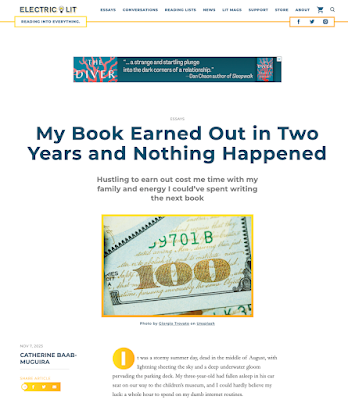Traditional publishing deals generally work where the author gets an advance from the publisher against the book's future earnings. The publisher accounts for each sale (holding back reserves for returns, though that's a topic for a different blog post), and once they have earned back the full amount of the advance, you are said to have "Earned Out" that advance.
At which point you start earning royalties on sales of the book.
Everyone wants their book to earn out, but the sad reality is that many books don't earn out. Ever.
And there's a delicate balance, where agents and authors like the idea of a large advance, but if it's too large and the sales don't materialize—if the publisher loses too much on a book—it can be hard to get that next deal.
With this context, the essay “My Book Earned Out in Two Years and Nothing Happened” by Catherine Baab-Muguira over at Electric Lit is well-worth reading.
Catherine writes about earning out the advance of her debut book:
And all it had cost me was incalculable time and energy, weekends with my family, the opportunity to finesse and sell another book.
And
I didn’t shatter my advance with record-breaking sales. I didn’t go on late-night television shows. I didn’t become a household name. I just became one of the 25 to 30 percent of authors who do earn out their advances, and who still remain nobodies, midlist maybes, yesterday’s “some personal news” tweets. Of all the hardships that characterize the writing life, I’m not ashamed to say this one has hit me the hardest.
I share not to bum you out, but in the face of Catherine's noting:
I’d always thought writers were full of shit when they said publishing a book doesn’t change your life. Now I know what they mean.
It's worth acknowledging that writing (and yes, translating and illustrating as well) cannot be just about the money. For us to stay sane as we create works for kids, tweens, and teens, we have to have other goals in mind.
We need to really think about what constitutes success for us. For each book.
Catherine's focus of the essay was that it took her two years to earn out. Another focus might have been that she sold 10,000 copies of her book -- 10,000 copies of her book that reached readers. And if some of those copies were shared, or acquired by libraries, maybe her words and story reached many more than 10,000 readers.
And that's something worth celebrating, too.
What about the impact on a single reader? Harder to quantify, but that's another focus of success as well.
Food for thought on this publishing adventure,
Illustrate, Translate, and Write On,
Lee


No comments:
Post a Comment